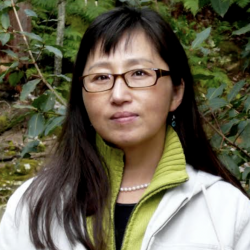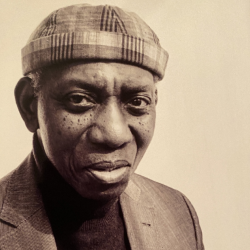Words out Loud is a monthly first Friday spoken word series. Months
alternate between featured readers and an Opposites Attract thematic
open mic focusing on opposites. For August, bring one poem each on the
topics of high(s) and low(s), interpreted as you choose. Time allotted
will depend on the number of participants but will likely be 2-3
minutes each.
Underworld (Day Forty-Five)
Don Mee Choi Translated from the Korean written by Kim Hyesoon
copyright ©2018
The dead without faces
run out like patients
when the door of the intensive care unit opens
carrying pouches of heart, pouches of urine
The dead running toward the path to the underworld
turn into stone pillars when they look back and their eyes meet
their past
The dead in their sacks look out with eyes brimming with salt
water
The dead become pillars of water as their tears melt their bones
The dead, gone forever, departed before you,
pull amniotic sacs over their heads and get in line to be born
again
and say that they need to learn their mother tongue all over
again
You’re not there when they awake or even when they eat
breakfast
When the dead swarm down the mountain
like children who pour out of the door of the first-grade room
carrying their notebooks and shoe bags
a four-ton bronze bell with a thousand names of the dead
engraved on it dangles from the helicopter
The helicopter flies over a tall mountain to hang the bell at a
temple hidden deep in the mountains
Notes on the Poem
This week’s poem launches our Poem of the Week’s new focus on the poet-translator. Over the next few months, we will be featuring material (interviews, poems, essays) exploring the complex relationship between poetry and translation. The Griffin Poetry Prize is one of the very few international prizes that accepts works in translation (under the condition that the work be translated to English). By featuring poems in translation, we wish to highlight creative affinities between our shortlisted poets, as well as translation as an act of creative collaboration. We begin the week with “Underworld,” from the 2019 winning collection, Autobiography of Death (2019), translated by Don Mee Choi and written by Kim Hyesoon. “In the grievous wake of the Sewol Ferry incident of 2014, the Korean poet Kim Hyesoon composed a cycle of forty-nine poems – one for each day the dead must await reincarnation – to produce a harrowing work of shock, outrage, and veneration for the children lost to this disaster. Through Don Mee Choi’s extraordinary translations, we hear the clamorous registers of Kim’s art – a transnational collision of shamanism, Modernism, and feminism – yield ‘a low note no one has ever sung before.’ That otherworldly tone may sound like life itself, the poet sings, ‘for even death can’t enter this deep inside me,'" the judges said. Listen to Don Mee Choi and Kim Hyesoon read poems from Autobiography of Death here.
The Sealey Challenge
During the month of August, participants read a poetry chapbook or full-length collection a day for 31 days while sharing their reads on social media using the hashtag #TheSealeyChallenge, named after poet Nicole Sealey.
Apply for Horizons Writers Circle
Here is a wonderful mentorship opportunity through the Writers’ Guild of Alberta. Apply by July 31, 2021 to be part of the Horizons Writers Circle as a mentor or a mentee.
Black Hair
Tracy K. Smith and Changtai Bi translated from the Chinese by Yi Lei
copyright ©2020
Black hair like youth
Runs wild in March.
Dark papery leaves fly
Teeming, swarming,
Bum-rushing March.
Black hair in March
Is gentle, strangers’ eyes
Softer. Memory:
A feast on offer. Youth,
Born of the primordial sea—
Embrace me. Drape my skin
Old as clouds
In something suppler.
Black hair
Blown free, rootless,
Wanders the desert’s
Countless tombs, sways
Across a vacant sky,
Whips at fresh mud in rain.
Days blaze past. I have
Lost sight of my own black hair
In the mirror. Let me
Watch it now
For the next thousand years.
Black hair weedy
In dirt-poor soil.
Thirsty, deluded,
Squandering its spoils.
Black hair has no idea.
The story of black hair
Is my story.
When I die, let me drift
Like a dandelion
Of black hair.
Black hair
Like holy water
No way, there is no way
To be saved except to die.
When black hair cries,
Itsw tears snuff themselves out
Like candles.
So will my life cease to flicker.
Black hair
Exhausted brush fire
Fanned by misery
Whistling
Through the last century.
Black hair, ?Shredded black flag
Of a women’s glory
Ragged and battered
In March wind.
Forsaking dignity
Absolved of chastity
With its pride in knots
Black hair smiles easily
In March.
If waterfall, it will plummet.
If cloud, it will scatter.
Eyes plaintive, wide,
Black hair waits to be spun
By hardened hands
Into rock.
March 25, 1987
Notes on the Poem
Our Poem of the Week continues to celebrate the 2021 Griffin Poetry Prize shortlisted poets. This week’s poem, “Black Hair,” is from the shortlisted collection, My Name Will Grow Wide Like a Tree by Tracy K. Smith and Changtai Bi translated from the Chinese written by Yi Lei—a collection that “gathers poems of eros and grief, each page bursting with attentiveness to our world.” (Judges' citation) Listen to Tracy K. Smith read the Poem of the Week in a beautifully illustrated excerpt from the Griffin Poetry Prize Winners Announcement Film
The VMI Betsy Warland Between Genres Award submission period
The VMI Betsy Warland Between Genres Award is for a book published in Canada in 2021 that is a hybrid genre, or straddles two or more genres. The winner will receive $500 at a ceremony at The Vancouver Writers Fest in Fall 2021, presented by judge Wayde Compton with Betsy Warland, special guest of honour. Two Honourable Mentions (no cash prize) will also be awarded.
Jane Munro and Ian Williams: Poets Corner Reading Series
Last of the Monkey Gods
Yusef Komunyakaa
copyright ©2012
The moon temple ghosts, swinging on heavy doors.
They ride rabid dogs in the alleys of ill repute.
They decipher the language of crows at dawn
in ancient trees, the blueness of a god’s skin.
They tiptoe power lines, rope bridges around the city.
They throw stones at the ambassador’s sedan.
When afternoon prayers begin, they grown silent,
Lying in each other’s arms, dreaming of clemency.
The monkeys are no rounding up street boys.
At least, at first, it seems this is true, but in no time
The boys learn to single out a monkey in the throng
& wrestle him to the ground. He may try to bite
& to scratch, to howl, & cry ceremoniously, to plead
with the one word he knows, but then the fight
goes out of him when the rest of his great clean
returns to jabbering & the sacred picking of lice.
The boys zap him with a small laser gun.
A garnet of mute bells is tossed into the dust,
& chants go aeons back to the beginning & die.
The fearless illumination goes out of his eyes.
The boys tag him. He rises to wander freely.
As naked unholiness crawls into the night,
they’re wrestled one by one to the ground
& castrated for the music of coins jangling in a pocket.
Notes on the Poem
This week, we celebrate our 2021 Lifetime Recognition Award Recipient, Yusef Komunyakaa with “Last of the Monkey Gods,” a poem from his 2012 Griffin-shortlisted collection, The Chameleon Couch (Farrar, Straus and Giroux). “Like the chameleon poem described by Keats, Komunyakaa draws in his work on a deep well of empathetic imagination, peopling his poems with an array of characters for whom ‘truth’ takes on wildly different hues. His poems tell a story, too, about the synthesis of disparate influences: the Southern idiom of Bogalusa, Louisiana where he grew up harmonises in them with a literary language seasoned by a lifetime’s vast and attentive reading,” writes Griffin Trustee Sarah Howe in her powerful tribute to Komunyakaa. In an exclusive Griffin interview, Komunyakaa answers Howe’s brilliant questions on a literary career that spans several decades and that keeps evolving. Stay tuned for this week’s release on our website and social media channels!
Victoria Chang reads at Women Speak
Looking at the Line – poetry writing class
South Bank Poetry Editor Katherine Lockton runs regular Saturday poetry writing classes online. Join South Bank Poetry for their online programme of poetry writing classes, which provide a fun, personal and accessible approach to learning how to write poetry, in a friendly environment that puts the student’s learning experience first.
The class level for this session is beginner friendly. It asks “Is there such a thing as a perfect line of poetry? How can you control the line?” Poetry techniques taught focus on how to manipulate the poetic line.




